By Charles Kollmer · Monday, August 8, 2011 As an occasional feature on TELOSscope, we highlight a past Telos article whose critical insights continue to illuminate our thinking and challenge our assumptions. Today, Charles Kollmer looks at Nicholas Joll’s “How Should Philosophy Be Clear? Loaded Clarity, Default Clarity, and Adorno,” from Telos 146 (Spring 2009).
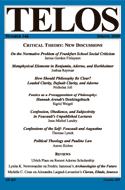 In an apropos piece of metaphilosophy entitled “How Should Philosophy Be Clear?” Nicholas Joll offers several insights on the concept of clarity in relation to philosophical texts. On initial inspection, Joll’s style seems to reveal a bias towards the Analytical tradition in philosophy: his argumentation is clearly organized, rigorous, and formulated in logical propositions. Yet his work also attains the savvy and self-awareness that renders metaphilosophy convincing, as demonstrated in his first proposition, which states that any notion of clarity will be partisan with regards to the Analytical-Continental divide. In spite of this partisanship, Joll champions a concept of “default clarity” and demonstrates its aptitude for judiciously evaluating argumentation. He shrewdly refuses to overdetermine the prescriptive force of default clarity. Far from an immutable law, default clarity offers broad guidelines with the caveat that “the justificatory burden lies with those who would eschew such clarity.” In an apropos piece of metaphilosophy entitled “How Should Philosophy Be Clear?” Nicholas Joll offers several insights on the concept of clarity in relation to philosophical texts. On initial inspection, Joll’s style seems to reveal a bias towards the Analytical tradition in philosophy: his argumentation is clearly organized, rigorous, and formulated in logical propositions. Yet his work also attains the savvy and self-awareness that renders metaphilosophy convincing, as demonstrated in his first proposition, which states that any notion of clarity will be partisan with regards to the Analytical-Continental divide. In spite of this partisanship, Joll champions a concept of “default clarity” and demonstrates its aptitude for judiciously evaluating argumentation. He shrewdly refuses to overdetermine the prescriptive force of default clarity. Far from an immutable law, default clarity offers broad guidelines with the caveat that “the justificatory burden lies with those who would eschew such clarity.”
Continue reading →
By Charles Kollmer · Tuesday, August 2, 2011 As an occasional feature on TELOSscope, we highlight a past Telos article whose critical insights continue to illuminate our thinking and challenge our assumptions. Today, Charles Kollmer looks at David Jenemann’s “Adorno Unplugged: The Ambivalence of the Machine Age,” from Telos 149 (Winter 2009).
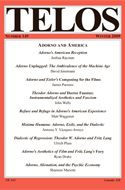 The work of Theodor W. Adorno is replete with paradox, and the abundant and irresolvable tensions in his writings reflect the disheartening milieu in which he wrote. Based on a cursory reading of “The Culture Industry: Enlightenment as Mass Deception,” from Adorno and Horkheimer’s Dialectic of Enlightenment, we might be left with the impression that Adorno wielded this rhetorical weapon in a uniform manner, indicating the ways in which the modern fruits of Enlightenment contradict the original ethos of Enlightenment thought. Indeed, these are difficult charges to refute, as modernity’s myriad episodes of mass violence render notions of teleological “progress” rather untenable. Poststructuralist thought exhibits a reverence for this innovation in thinking. According to Antoni Negri, “Adorno’s model of cultural criticism genuinely uncovered the ontology of the new world” (cited in Jenemann). Yet these same tracts always contain caveats, noting that, despite the paradox and contradiction inherent in modern infrastructure and society, modernity presents us with multitudinous opportunities for radically disrupting the stasis of the status quo. This is the “situation of those who are living through the passage from modernity to postmodernity,” writes Negri. Such caveats imply that Adorno’s critical theory fails to recognize these possibilities for change, at worst typecasting him as a grumpy Luddite. The work of Theodor W. Adorno is replete with paradox, and the abundant and irresolvable tensions in his writings reflect the disheartening milieu in which he wrote. Based on a cursory reading of “The Culture Industry: Enlightenment as Mass Deception,” from Adorno and Horkheimer’s Dialectic of Enlightenment, we might be left with the impression that Adorno wielded this rhetorical weapon in a uniform manner, indicating the ways in which the modern fruits of Enlightenment contradict the original ethos of Enlightenment thought. Indeed, these are difficult charges to refute, as modernity’s myriad episodes of mass violence render notions of teleological “progress” rather untenable. Poststructuralist thought exhibits a reverence for this innovation in thinking. According to Antoni Negri, “Adorno’s model of cultural criticism genuinely uncovered the ontology of the new world” (cited in Jenemann). Yet these same tracts always contain caveats, noting that, despite the paradox and contradiction inherent in modern infrastructure and society, modernity presents us with multitudinous opportunities for radically disrupting the stasis of the status quo. This is the “situation of those who are living through the passage from modernity to postmodernity,” writes Negri. Such caveats imply that Adorno’s critical theory fails to recognize these possibilities for change, at worst typecasting him as a grumpy Luddite.
Continue reading →
By Laura Groenendaal · Wednesday, July 27, 2011 As an occasional feature on TELOSscope, we highlight a past Telos article whose critical insights continue to illuminate our thinking and challenge our assumptions. Today, Laura Groenendaal looks at Hans Ulrich Gumbrecht’s “From Oedipal Hermeneutics to a Philosophy of Presence,” from Telos 138 (Spring 2007).
In his article “From Oedipal Hermeneutics to a Philosophy of Presence,” Hans Ulrich Gumbrecht responds to a colloquium’s debate on whether “academic heresy” can produce “revolutions within the humanities” by rejecting its language:
I see the humanities as a cluster of disciplines that continuously shifts and, by shifting, transforms itself—mostly (but not always) without any programmatic direction, and sometimes stirring up sudden splashes, waves, and even tsunamis in the formless ocean of the public sphere. If anything, such splashes, waves, and tsunamis follow (and here I am producing my own metaphorical contradiction) an emotional “logic” of family romances and oedipal revolts, rather than the institutional logic of heresies and revolutions.
Continue reading →
By Charles Kollmer · Monday, July 18, 2011 As an occasional feature on TELOSscope, we highlight a past Telos article whose critical insights continue to illuminate our thinking and challenge our assumptions. Today, Charles Kollmer looks at Kai Evers’s “The Holes of Oblivion: Arendt and Benjamin on Storytelling in the Age of Totalitarian Destruction” from Telos 132 (Fall 2005).
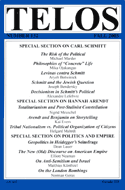 A central concern of critical theory revolves around the difficulty of communicating in the wake of modernity’s crises. Unprecedented trauma and violence obliterate tradition, which historically formed the necessary context for lucid and comprehensible stories. Walter Benjamin famously observed that veterans of World War I returned “not richer but poorer in communicable experience.” In the wake of the war, he notes, the word bekanntlich, or “as everybody well knows,” lost its currency, leaving only Erfahrungsarmut, “the new poverty of experience.” In response to this situation, Benjamin valorized the anti-aesthetic manifest in the works of Karl Kraus and Berthold Brecht, concluding that “all that remains is the discipline of those who destroy.” A similar current of thought underpins many of the philosophical and aesthetic developments in postwar culture, from the Frankfurt School’s critique of Enlightenment empiricism to the Dadaist rejection of canonical artistic authority. A central concern of critical theory revolves around the difficulty of communicating in the wake of modernity’s crises. Unprecedented trauma and violence obliterate tradition, which historically formed the necessary context for lucid and comprehensible stories. Walter Benjamin famously observed that veterans of World War I returned “not richer but poorer in communicable experience.” In the wake of the war, he notes, the word bekanntlich, or “as everybody well knows,” lost its currency, leaving only Erfahrungsarmut, “the new poverty of experience.” In response to this situation, Benjamin valorized the anti-aesthetic manifest in the works of Karl Kraus and Berthold Brecht, concluding that “all that remains is the discipline of those who destroy.” A similar current of thought underpins many of the philosophical and aesthetic developments in postwar culture, from the Frankfurt School’s critique of Enlightenment empiricism to the Dadaist rejection of canonical artistic authority.
Continue reading →
By Charles Kollmer · Monday, July 11, 2011 As an occasional feature on TELOSscope, we highlight a past Telos article whose critical insights continue to illuminate our thinking and challenge our assumptions. Today, Charles Kollmer looks at Alexandre Lefebvre’s “A New Image of Law: Deleuze and Jurisprudence,” from Telos 130 (Spring 2005).
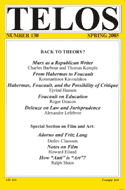 Even readers with a cursory familiarity with Gilles Deleuze’s work will have no trouble surmising his critical attitude toward the law. As an abstracting and generalizing social force, law seems to stand in stark opposition to watchwords like immanence and singularity that pervade Deleuze’s texts. In “A New Image of Law: Deleuze and Jurisprudence,” Alexandre Lefebvre offers a novel interpretation of this antagonism toward the law, starting by distinguishing between law and jurisprudence. As the philosophy that informs the practice of law, jurisprudence interrupts the stasis of the legal code by actively applying it to a case. In turn, a given case takes on a genetic role in future versions of the law (conventionally referred to as precedent). Jurisprudence liberates law from appeals to transcendent values by insisting on its relevance to the here-and-now, as well as its role in the genesis of the yet-to-come. In his article, Lefebvre elaborates on this dynamic, starting with a summary of Deleuzian critiques of law, then moving toward what he terms “a new image of law,” drawing on Henri Bergson’s metaphysics in the process. Even readers with a cursory familiarity with Gilles Deleuze’s work will have no trouble surmising his critical attitude toward the law. As an abstracting and generalizing social force, law seems to stand in stark opposition to watchwords like immanence and singularity that pervade Deleuze’s texts. In “A New Image of Law: Deleuze and Jurisprudence,” Alexandre Lefebvre offers a novel interpretation of this antagonism toward the law, starting by distinguishing between law and jurisprudence. As the philosophy that informs the practice of law, jurisprudence interrupts the stasis of the legal code by actively applying it to a case. In turn, a given case takes on a genetic role in future versions of the law (conventionally referred to as precedent). Jurisprudence liberates law from appeals to transcendent values by insisting on its relevance to the here-and-now, as well as its role in the genesis of the yet-to-come. In his article, Lefebvre elaborates on this dynamic, starting with a summary of Deleuzian critiques of law, then moving toward what he terms “a new image of law,” drawing on Henri Bergson’s metaphysics in the process.
Continue reading →
By Maxwell Woods · Tuesday, January 4, 2011 On Tuesdays at the TELOSscope blog, we highlight a past Telos article whose critical insights continue to illuminate our thinking and challenge our assumptions. Today, Maxwell Woods looks at David Pan’s “The Crisis of the Humanities and the End of the University,” from Telos 111 (Spring 1998).
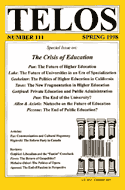 Acknowledged by the London Times as the center of one of the five greatest orchestras in the world (the Simón Bolívar Youth Orchestra), generating some of today’s most important musicians, and declared by the renowned conductor Simon Rattle as the “future of music,” a new educational force has penetrated the international music consciousness. Yet, the educational institution producing one of the world’s most significant orchestras is not the result of the traditional bastions of Western orchestral music; instead, it is the direct consequence of community education in the barrios of Venezuela. The youth music program, “El Sistema,” functions by organizing “nucleos,” educational centers started and maintained by local leaders for high-level orchestral music that are located in and run as part of the community. Instead of being sent off to the conservatory or university, children learn how to play orchestral music in their own neighborhood from instructors who are members of the locality. Acknowledged by the London Times as the center of one of the five greatest orchestras in the world (the Simón Bolívar Youth Orchestra), generating some of today’s most important musicians, and declared by the renowned conductor Simon Rattle as the “future of music,” a new educational force has penetrated the international music consciousness. Yet, the educational institution producing one of the world’s most significant orchestras is not the result of the traditional bastions of Western orchestral music; instead, it is the direct consequence of community education in the barrios of Venezuela. The youth music program, “El Sistema,” functions by organizing “nucleos,” educational centers started and maintained by local leaders for high-level orchestral music that are located in and run as part of the community. Instead of being sent off to the conservatory or university, children learn how to play orchestral music in their own neighborhood from instructors who are members of the locality.
Continue reading →
|
|
 In an apropos piece of metaphilosophy entitled “How Should Philosophy Be Clear?” Nicholas Joll offers several insights on the concept of clarity in relation to philosophical texts. On initial inspection, Joll’s style seems to reveal a bias towards the Analytical tradition in philosophy: his argumentation is clearly organized, rigorous, and formulated in logical propositions. Yet his work also attains the savvy and self-awareness that renders metaphilosophy convincing, as demonstrated in his first proposition, which states that any notion of clarity will be partisan with regards to the Analytical-Continental divide. In spite of this partisanship, Joll champions a concept of “default clarity” and demonstrates its aptitude for judiciously evaluating argumentation. He shrewdly refuses to overdetermine the prescriptive force of default clarity. Far from an immutable law, default clarity offers broad guidelines with the caveat that “the justificatory burden lies with those who would eschew such clarity.”
In an apropos piece of metaphilosophy entitled “How Should Philosophy Be Clear?” Nicholas Joll offers several insights on the concept of clarity in relation to philosophical texts. On initial inspection, Joll’s style seems to reveal a bias towards the Analytical tradition in philosophy: his argumentation is clearly organized, rigorous, and formulated in logical propositions. Yet his work also attains the savvy and self-awareness that renders metaphilosophy convincing, as demonstrated in his first proposition, which states that any notion of clarity will be partisan with regards to the Analytical-Continental divide. In spite of this partisanship, Joll champions a concept of “default clarity” and demonstrates its aptitude for judiciously evaluating argumentation. He shrewdly refuses to overdetermine the prescriptive force of default clarity. Far from an immutable law, default clarity offers broad guidelines with the caveat that “the justificatory burden lies with those who would eschew such clarity.”  The work of Theodor W. Adorno is replete with paradox, and the abundant and irresolvable tensions in his writings reflect the disheartening milieu in which he wrote. Based on a cursory reading of “The Culture Industry: Enlightenment as Mass Deception,” from Adorno and Horkheimer’s Dialectic of Enlightenment, we might be left with the impression that Adorno wielded this rhetorical weapon in a uniform manner, indicating the ways in which the modern fruits of Enlightenment contradict the original ethos of Enlightenment thought. Indeed, these are difficult charges to refute, as modernity’s myriad episodes of mass violence render notions of teleological “progress” rather untenable. Poststructuralist thought exhibits a reverence for this innovation in thinking. According to Antoni Negri, “Adorno’s model of cultural criticism genuinely uncovered the ontology of the new world” (cited in Jenemann). Yet these same tracts always contain caveats, noting that, despite the paradox and contradiction inherent in modern infrastructure and society, modernity presents us with multitudinous opportunities for radically disrupting the stasis of the status quo. This is the “situation of those who are living through the passage from modernity to postmodernity,” writes Negri. Such caveats imply that Adorno’s critical theory fails to recognize these possibilities for change, at worst typecasting him as a grumpy Luddite.
The work of Theodor W. Adorno is replete with paradox, and the abundant and irresolvable tensions in his writings reflect the disheartening milieu in which he wrote. Based on a cursory reading of “The Culture Industry: Enlightenment as Mass Deception,” from Adorno and Horkheimer’s Dialectic of Enlightenment, we might be left with the impression that Adorno wielded this rhetorical weapon in a uniform manner, indicating the ways in which the modern fruits of Enlightenment contradict the original ethos of Enlightenment thought. Indeed, these are difficult charges to refute, as modernity’s myriad episodes of mass violence render notions of teleological “progress” rather untenable. Poststructuralist thought exhibits a reverence for this innovation in thinking. According to Antoni Negri, “Adorno’s model of cultural criticism genuinely uncovered the ontology of the new world” (cited in Jenemann). Yet these same tracts always contain caveats, noting that, despite the paradox and contradiction inherent in modern infrastructure and society, modernity presents us with multitudinous opportunities for radically disrupting the stasis of the status quo. This is the “situation of those who are living through the passage from modernity to postmodernity,” writes Negri. Such caveats imply that Adorno’s critical theory fails to recognize these possibilities for change, at worst typecasting him as a grumpy Luddite.  A central concern of critical theory revolves around the difficulty of communicating in the wake of modernity’s crises. Unprecedented trauma and violence obliterate tradition, which historically formed the necessary context for lucid and comprehensible stories. Walter Benjamin famously observed that veterans of World War I returned “not richer but poorer in communicable experience.” In the wake of the war, he notes, the word bekanntlich, or “as everybody well knows,” lost its currency, leaving only Erfahrungsarmut, “the new poverty of experience.” In response to this situation, Benjamin valorized the anti-aesthetic manifest in the works of Karl Kraus and Berthold Brecht, concluding that “all that remains is the discipline of those who destroy.” A similar current of thought underpins many of the philosophical and aesthetic developments in postwar culture, from the Frankfurt School’s critique of Enlightenment empiricism to the Dadaist rejection of canonical artistic authority.
A central concern of critical theory revolves around the difficulty of communicating in the wake of modernity’s crises. Unprecedented trauma and violence obliterate tradition, which historically formed the necessary context for lucid and comprehensible stories. Walter Benjamin famously observed that veterans of World War I returned “not richer but poorer in communicable experience.” In the wake of the war, he notes, the word bekanntlich, or “as everybody well knows,” lost its currency, leaving only Erfahrungsarmut, “the new poverty of experience.” In response to this situation, Benjamin valorized the anti-aesthetic manifest in the works of Karl Kraus and Berthold Brecht, concluding that “all that remains is the discipline of those who destroy.” A similar current of thought underpins many of the philosophical and aesthetic developments in postwar culture, from the Frankfurt School’s critique of Enlightenment empiricism to the Dadaist rejection of canonical artistic authority.  Even readers with a cursory familiarity with Gilles Deleuze’s work will have no trouble surmising his critical attitude toward the law. As an abstracting and generalizing social force, law seems to stand in stark opposition to watchwords like immanence and singularity that pervade Deleuze’s texts. In “A New Image of Law: Deleuze and Jurisprudence,” Alexandre Lefebvre offers a novel interpretation of this antagonism toward the law, starting by distinguishing between law and jurisprudence. As the philosophy that informs the practice of law, jurisprudence interrupts the stasis of the legal code by actively applying it to a case. In turn, a given case takes on a genetic role in future versions of the law (conventionally referred to as precedent). Jurisprudence liberates law from appeals to transcendent values by insisting on its relevance to the here-and-now, as well as its role in the genesis of the yet-to-come. In his article, Lefebvre elaborates on this dynamic, starting with a summary of Deleuzian critiques of law, then moving toward what he terms “a new image of law,” drawing on Henri Bergson’s metaphysics in the process.
Even readers with a cursory familiarity with Gilles Deleuze’s work will have no trouble surmising his critical attitude toward the law. As an abstracting and generalizing social force, law seems to stand in stark opposition to watchwords like immanence and singularity that pervade Deleuze’s texts. In “A New Image of Law: Deleuze and Jurisprudence,” Alexandre Lefebvre offers a novel interpretation of this antagonism toward the law, starting by distinguishing between law and jurisprudence. As the philosophy that informs the practice of law, jurisprudence interrupts the stasis of the legal code by actively applying it to a case. In turn, a given case takes on a genetic role in future versions of the law (conventionally referred to as precedent). Jurisprudence liberates law from appeals to transcendent values by insisting on its relevance to the here-and-now, as well as its role in the genesis of the yet-to-come. In his article, Lefebvre elaborates on this dynamic, starting with a summary of Deleuzian critiques of law, then moving toward what he terms “a new image of law,” drawing on Henri Bergson’s metaphysics in the process.  Acknowledged by the London Times as the center of one of the five greatest orchestras in the world (the Simón Bolívar Youth Orchestra), generating some of today’s most important musicians, and declared by the renowned conductor Simon Rattle as the “future of music,” a new educational force has penetrated the international music consciousness. Yet, the educational institution producing one of the world’s most significant orchestras is not the result of the traditional bastions of Western orchestral music; instead, it is the direct consequence of community education in the barrios of Venezuela. The youth music program, “El Sistema,” functions by organizing “nucleos,” educational centers started and maintained by local leaders for high-level orchestral music that are located in and run as part of the community. Instead of being sent off to the conservatory or university, children learn how to play orchestral music in their own neighborhood from instructors who are members of the locality.
Acknowledged by the London Times as the center of one of the five greatest orchestras in the world (the Simón Bolívar Youth Orchestra), generating some of today’s most important musicians, and declared by the renowned conductor Simon Rattle as the “future of music,” a new educational force has penetrated the international music consciousness. Yet, the educational institution producing one of the world’s most significant orchestras is not the result of the traditional bastions of Western orchestral music; instead, it is the direct consequence of community education in the barrios of Venezuela. The youth music program, “El Sistema,” functions by organizing “nucleos,” educational centers started and maintained by local leaders for high-level orchestral music that are located in and run as part of the community. Instead of being sent off to the conservatory or university, children learn how to play orchestral music in their own neighborhood from instructors who are members of the locality. 

